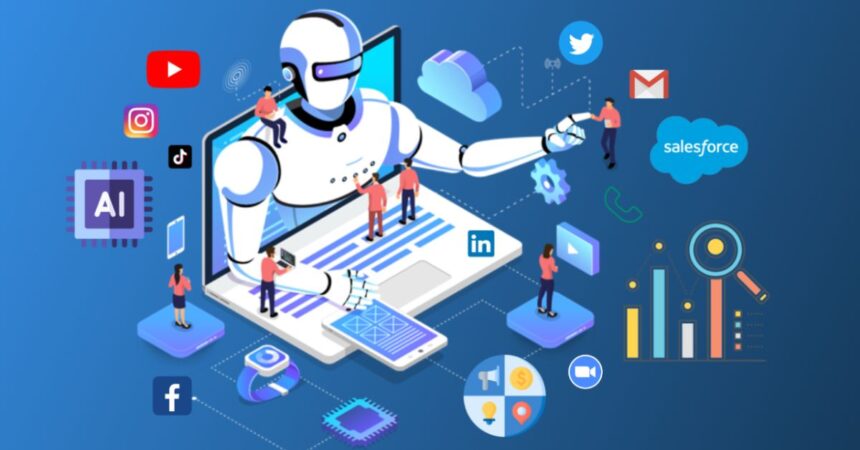Artificial Intelligence (AI) is reshaping modern marketing strategies in remarkable ways. As businesses strive to stay ahead, understanding the role of AI becomes crucial. This technology is changing how companies reach their audiences and enhancing the effectiveness of their marketing campaigns.
In today’s changing digital world, marketing strategies are constantly evolving. AI has emerged as a game-changer, offering tools that improve targeting, personalization, and efficiency. The article provides insights into how AI is revolutionizing marketing, offering solutions that can help businesses maximize their reach and engagement.
The Role of AI in Marketing
AI is now at the heart of many marketing strategies. By analyzing vast amounts of data, AI helps marketers understand customer behavior more deeply. This information allows for more accurate targeting and personalized content, leading to better engagement and conversion rates.
AI tools can predict customer preferences, automate repetitive tasks, and provide insights that were previously difficult to obtain. Explore more updates about effective marketing updates at https://putflix.com/.
Enhanced Targeting and Personalization
One of the most significant impacts of AI is its ability to enhance targeting and personalization. Traditional marketing methods often rely on broad demographics to reach potential customers. AI, however, can analyze individual behaviors and preferences to create highly targeted marketing campaigns. This means that marketing messages can be tailored specifically to each user, improving the chances of conversion.
For instance, AI algorithms can track user interactions on websites and social media platforms. This data helps in creating personalized advertisements and recommendations that are more likely to resonate with individual users. As a result, businesses can deliver relevant content to their audience, increasing engagement and boosting sales.
Automation and Efficiency
AI also plays a crucial role in automating marketing processes. AI systems can now handle Tasks that require significant human effort, freeing up time for marketers to focus on strategic planning. AI-powered automation tools can manage email campaigns, schedule social media posts, and analyze campaign performance, all with minimal human intervention.
This automation not only improves efficiency but also ensures consistency in marketing efforts. As companies adopt advanced tools, platforms like globerage.com offer valuable insights into effective strategies and trends. AI systems can execute campaigns at optimal times based on data-driven insights, leading to better results. By streamlining processes, businesses can reduce costs and increase their overall productivity.
Data-Driven Insights
AI’s ability to process and analyze large amounts of data is a game-changer for marketing. Traditional methods of analyzing marketing data were often time-consuming and limited in scope. AI, on the other hand, can quickly analyze complex data sets, providing actionable insights that can inform marketing strategies.
With AI, businesses can track key performance indicators (KPIs) more accurately and identify trends and patterns that might otherwise go unnoticed. This data-driven approach allows for more informed decision-making and helps marketers adjust their strategies in real time to achieve better outcomes.
AI-Powered Content Creation
Content creation is another area where AI is making a significant impact. AI tools can assist in generating content ideas, writing articles, and even creating visual assets. While human creativity remains essential, AI can support the content creation process by providing data-driven insights and generating initial drafts.
For instance, AI-powered tools can analyze popular topics and trends to suggest content ideas that are likely to engage the target audience. Additionally, AI can help in creating personalized content by analyzing user preferences and tailoring messages accordingly. This not only speeds up the content creation process but also ensures that the content is relevant and appealing to the audience.
Improved Customer Service
AI is also transforming customer service in marketing. Chatbots and virtual assistants powered by AI can handle customer inquiries and provide support around the clock. These tools can answer frequently asked questions, assist with product recommendations, and even resolve issues without human intervention.
By using AI for customer service, businesses can offer a more responsive and efficient support experience. Chatbots can handle multiple interactions simultaneously, providing quick and accurate responses to customers. This improves customer satisfaction and allows human agents to focus on more complex issues that require personal attention.
Challenges and Considerations
While AI offers numerous benefits, it also presents certain challenges. One of the main concerns is data privacy. With AI systems analyzing vast amounts of personal data, businesses must ensure that they comply with data protection regulations and handle customer information responsibly.
Additionally, there is the issue of balancing automation with human touch. While AI can handle many tasks efficiently, it is essential to maintain a human element in marketing to build genuine connections with customers. Striking the right balance between automation and personalization is key to successful AI integration in marketing strategies.
The Future of AI in Marketing
Looking ahead, AI will continue to play a central role in shaping marketing strategies. As technology advances, AI tools will become even more sophisticated, offering new possibilities for targeting, personalization, and efficiency. Businesses that embrace AI will be better positioned to adapt to changing market conditions and meet the evolving needs of their customers.
Conclusion
AI is revolutionizing modern marketing strategies by enhancing targeting, automation, and data analysis. By leveraging AI tools and technologies, businesses can create more effective marketing campaigns, improve customer experiences, and drive growth. As AI continues to evolve, it will undoubtedly unlock new opportunities and challenges for marketers to explore.




